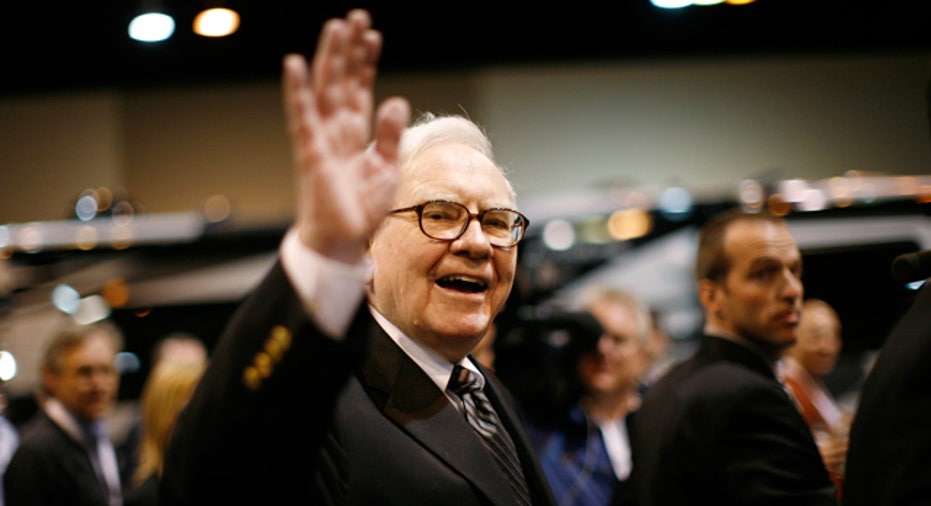Berkshire to Buy Back Shares

Warren Buffett's conglomerate Berkshire Hathaway said it will launch a share buyback program, an unprecedented move from Buffett that comes after months of investor complaints that the stock was undervalued.
Some long-time investors have said Berkshire shares were lately at their cheapest in a generation, and even analysts who were cautious on the stock acknowledged it was attractively priced. Yet Buffett has held his ground, preferring deals that grow margins and provide a return.
In his letter to shareholders last February, Buffett bragged that ``not a dime of cash has left Berkshire for dividends or share repurchases during the past 40 years.'' But Berkshire said Monday it was now willing to pay up to 10 percent more than book value for the stock.
``In the opinion of our Board and management, the underlying businesses of Berkshire are worth considerably more than this amount, though any such estimate is necessarily imprecise,'' Berkshire said in a statement.
One long-time Buffett investor said the ``Oracle of Omaha'' was effectively buying two things cheaply -- Berkshire as an operating company for a broad set of industrial and consumer businesses, and Berkshire as a portfolio of stocks that have been heavily sold of late.
``There's just so much leverage right now, this is close to as good a setup as you might ever see, to be a domestic play in a land of people hating domestic, with double leverage,'' said Bill Smead, chief investment officer of Smead Capital Management in Seattle.
Berkshire Hathaway Class A shares rose 5.3 percent to $105,600 in late-morning trading, while the more actively traded Class B stock rose 5.8 percent to $70.17. Last week, both classes fell to their lowest point since early 2010.
CASH ON HAND
The company said it would use cash on hand to fund the buybacks, but would not buy any shares if doing so took the company's cash position below $20 billion.
e 30 Berkshire's book value was $98,716 per Class A share, which would suggest the company would be willing to pay up to $108,588 per share in the buyback program.
Berkshire had $47.89 billion cash at June 30 but has spent at least $15 billion this quarter on acquisitions and investments, most notably the chemical company Lubrizol and a preferred stake in Bank of America.
Assuming Berkshire spent $10 billion buying back stock at the top of its stated range, it could end up repurchasing nearly 10 percent of its Class A shares.
``One might argue that he is making a statement about the overall market. Perhaps he thinks that the selling is excessive,'' said Michael Yoshikami, chief executive of investment manager YCMNET Advisors and a Berkshire holder.
Berkshire recently made a take-it-or-leave-it offer for reinsurance company Transatlantic Holdings that was rebuffed, an indication it is still in the market when the deal is right and companies are cheap, as is the case with Transatlantic.
But one investor said the buyback was an acknowledgment Buffett may have run out of things to buy with all that cash.
``Berkshire's path with cash has been to make outside acquisitions. Perhaps for the time being, that fishing pond has dried up,'' said John Augustine, chief investment strategist for Fifth Third Bank, which has $25.6 billion under management and owns Berkshire shares.
MORE SIGNS OF CHANGE
The buyback is just the latest sea change at Berkshire, which is slowly transforming itself as Buffett ages and begins to look toward the future of the conglomerate.
That future has been at the forefront of investor thinking since early this year, when Buffett's presumed heir apparent David Sokol left the company amid a scandal around his own personal investments in Lubrizol.
Berkshire has now brought on two investment managers who will help run its portfolio after Buffett retires, and the board is believed to have a short-list of candidates who would replace the ``Oracle of Omaha'' as chief executive.
``Charlie Munger and Warren Buffett do really good analysis when they make investments in other companies, and you can be sure they know what they're doing here,'' said Michael Holland, founder of Holland & Co, who oversees more than $4 billion of assets and owns Berkshire shares.



















